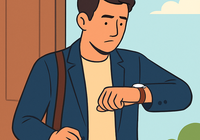| Phrasal verb | Main meaning |
|---|---|
be after [biː ˈɑːftə(r)] | to try to obtain or pursue someone or something |
Other meanings
- to chase or pursue (physically or metaphorically)
- to court or try to win someone's affection
- to try to get information or a statement
Example Sentences Using the Phrasal Verb "be after"
- I am after a new job.
- The police are after the suspect.
- He has been after her for months.
- Reporters are after a comment from the mayor.
- What exactly are you after?
- They are after cheaper suppliers to cut costs.
Features of Using "be after"
This phrasal verb is inseparable and normally takes an object (someone or something). It is common in informal spoken English and in journalistic contexts. When it means "want" or "try to obtain," it is particularly common in British English (e.g., "I am after a promotion"). When it means "pursue" or "chase," it can refer to police, competitors, or figurative goals. It can also mean "court" (romantic pursuit) or "try to get information" (e.g., reporters). Avoid splitting the particle from the verb.
Other phrasal verbs with the verb be
be back
to have returned to a place
be away
to be absent or not at home
be in
to be at home or in a particular place
be against
to oppose or disagree with someone or something
be on
to take place
be over
to have finished
be behind
to be late or delayed
be for
to support or favor something
be out
to be absent or not at home
be into
to be interested in or enthusiastic about something or someone
be out of
to have no more of something
be about to
to be on the point of doing something (imminent future)
be down
to not be working or functioning
be up
to be awake; not sleeping
be off
to leave or depart
be with
to support or agree with someone
be along
to arrive soon
be through
to have finished something
be up to
to be doing something (often secretly or mischievously)
🔗 Learn more about the irregular verb be, including its forms and usage.




















